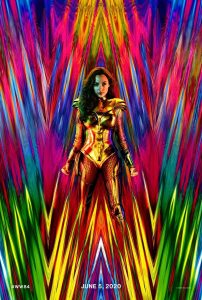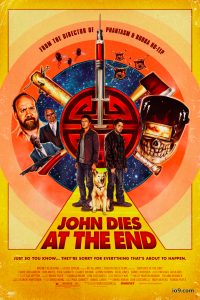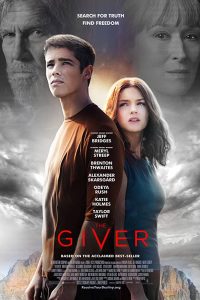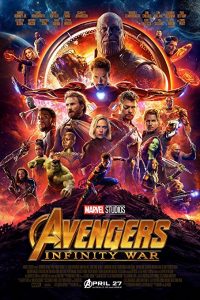Ghostride the Whip: Arley Sorg and Josh Pearce Discuss Wonder Woman 1984
 Some 70 years or so after the events of Wonder Woman, 1984 finds the titular hero (Gal Gadot) whiling away her time curating artifacts and impressing mortals with her beauty and charm. She seems to be keeping a low profile, at least until struggling entrepreneur Maxwell Lord (Pedro Pascal) acquires an ancient magical device and threatens to destroy the world in his quest for ultimate power. Wonder Woman must find a way to stop him, while also defeating the fairly random friend turned foe, Barbara Minerva/Cheetah (Kristen Wiig).
Some 70 years or so after the events of Wonder Woman, 1984 finds the titular hero (Gal Gadot) whiling away her time curating artifacts and impressing mortals with her beauty and charm. She seems to be keeping a low profile, at least until struggling entrepreneur Maxwell Lord (Pedro Pascal) acquires an ancient magical device and threatens to destroy the world in his quest for ultimate power. Wonder Woman must find a way to stop him, while also defeating the fairly random friend turned foe, Barbara Minerva/Cheetah (Kristen Wiig).
Arley: I’ll start, because I’m gonna frontload the positive —
Josh: Good, ’cause I’m not going to!
Arley: — and then we can commence shitting on this movie!
Josh: Go for it!
Arley: Okay. (Laughs.) So, the things I liked about this…
Wonder Woman 1984 does a lovely job of capturing the corniness of ’80s era superhero movies, cartoons, and DC brand comic books. Anyone who grew up watching the Christopher Reeves film series beginning with Superman in 1978 — followed by an even cornier Supergirl movie in 1984, the Wonder Woman TV show of the 70s starring Lynda Carter, and of course the Super Friends cartoon — will immediately recognize the color palette, the vibe, the clothes and hair, body language, and even the unrealistic but true-to-superhero-worlds dialogue. The movie even has moments which are probably call backs, or which will likely summon up memories of iconic moments: Wonder Woman saves someone from getting hit by a car, but the framing of the shot is reminiscent of Clark Kent getting hit by a car (only to leave the car dented) in the opening of a Superman movie. A later action scene has Wonder Woman lasso her way under a car in an action sequence pulled straight from an Indiana Jones movie.
For the most part, the tone of the film is a bit more on the positive and uplifting side, especially as compared to most recent DC movies. The last few Superman movies, including 2017’s Justice League, abandoned the old-school treatment of the Superman character as an idealistic “boy scout” figure in favor of moral ambiguity, tricky situations, and violence. The recent Batman movies were even more grimdark. This film hearkens back to days where superheroes were idealistic, less complex do-gooders. It’s kind of fun. This ’80s setting, though, has a veneer of cheesiness not present in throwback shows like Stranger Things that place the viewer in a more realistic setting.
Josh: I was watching it thinking, this is very campy, but is it a self-aware campiness? All the fashion, the lighting, the sets, the mall — this is like a caricature of the ’80s. I kept expecting the other shoe to drop, thinking it’s a joke, and then realized, wait, they’re playing this as serious.
Arley: Even the main theme of the movie embodies that corny superhero idealism: Truth. Which I kind of liked.
Josh: I appreciate that these Wonder Woman movies have themes — old-school comic book heroics that have ideals and idealism. The first movie was about “Love” and “only love can stop war,” or something.
Arley: Corny themes.
Josh: I don’t think this one sold its message as well as the first one did. I appreciate that they picked Truth in this political climate, but their examples are inconsistent: “Diana, you cheated, and the Truth is that you didn’t do this” — they use different kinds of truths, and not objective truths; it was a mixed message. Also they go from a bunch of campy stuff to “take this message seriously,” and I can’t do it because they’ve lost me at the corniness. But that’s not the worst part of the movie.
There are many “worst parts of this movie” but the most surprising is undoubtedly the way female characters are treated. Whatever the first movie might have accomplished in showing female empowerment and “centering females in the narrative,” this one reverted back to ’80s problems with gender. From a storytelling perspective, while Maxwell Lord and Barbara Minerva have clear goals, Wonder Woman herself is simply hanging out on screen until Maxwell Lord’s actions give her purpose, roughly midway into the movie. She is coasting through life as a character with no real story goal, her express role being to pine for her lost love, Steve Trevor (Chris Pine). When Trevor comes back, he even tells her that she should have things she wants to do, she should live life without him — as if someone snuck into the script and said, wait, shouldn’t the central character have agency in this film? — to which she replies: No. I only want you.
But wait, the worst gets even worse. They eventually power her down so that her guy can heroically save her, multiple times, as if folks just can’t stand to see a strong woman running around, kicking butt, and taking all the names. The only other central female character is Minerva/Cheetah, leaning into the age-old, sexist cliché of women being pitted against each other. Minerva’s story is straight out of the Nerd Girl/Hot Girl playbook, perpetuating cliché ideas around what “sexy” is, devaluing non-physical attributes. A trickle of dialogue weakly struggles against this, but the “important” conversations center around things like fighting in heels and love, rather than, you know, any number of topics the characters could have discussed, such as politics, famine, racism, economics, inequality; topics the settings and characters could have easily provoked; topics that probably would have been more at play if these had been male characters. This is just the obvious stuff, and yes, we could go on all day.
But wait, it gets creepy from here.
Josh: It’s very weird how they’re portraying gender roles. Every man that Wonder Woman and Minerva walked by all turned to look at, or cat call, or accost them — every single man in the entire movie did that, except for Chris Pine. Is it supposed to be commentary about men and women or the ’80s? What did it have to do with the overall message about Truth? It was really confusing. I was hoping that Wonder Woman would be pining for Steve Trevor, and then Brabra would become her friend, they’d fall in love, and the women would say, “We don’t need these dudes!”
Arley: That would have been an awesome movie!
Josh: Yeah, all she was worried about was Chris Pine showing up, and keeping him. At some point she has the moral dilemma of whether or not she’s gonna send him back.
Arley: But even that’s problematic, because Pine has taken over some guy’s body, they have no idea what has happened to the original owner of the body, if they destroyed his soul or something, and for a good while they don’t really worry about it. I was like, wait, are these the heroes? And they’re just eyeing each other and having a good time, not even worried about the harm they might have caused? Until a bit later, when offhandedly they’re like, oh, I guess we should figure out how this works.
Josh: I didn’t care about Wonder Woman’s story at all in the entire movie. I was more interested in Pedro Pascal and his rampage across the globe, buying up oil. Because he has to figure out how he’s going to do all these things, and his actions have actual consequences to everyone around him, and I was like, hey, an actual story is happening over here.
Arley: I had no sense of tension or danger at any point in the movie.
Unfortunately, this movie offers a long list of cinematic fails. The plot is terrible, plot points seem random, and story elements often make little sense. The worldbuilding has no underlying logic to it: things happen just because; things don’t work in certain ways just because; other things do work in certain ways just because. Attempts at comedy fall flat, such as Steve Trevor’s tired “fish out of water” routine, where he gawks at modern technology in awe, despite that he would have seen some version of most of the things that he’s gawking at, and despite that he’s a war veteran who, one would think, might be able to play it a bit cooler. Even central conceits seem ill-explained and somewhat random, such as how powers work, what the powers are, and what their limits are.
Josh: They were all over the place with Wonder Woman’s powers. I have no sense of tension or danger at all in this character. At least the fight scenes were fairly well choreographed. They had some good glamour shots of her in beautiful dresses, and the shot of them flying through the fireworks was nice, but completely unnecessary. And it was so stupid that they didn’t know what date it was. It’s the fourth, of course — like, the fourth of July? How do you not know what day it is? You’re in Washington DC.
Arley: Trevor is in awe of this fancy new technology, and then he flies a jet. I don’t know a lot about it, but I was pretty sure that flying a WWI bi-plane isn’t pretty much the same thing. He’s like, oh, here’s the button, I can totally fly this.
Josh: Partway through watching this thing I realized, ooooh, this movie is just not good, and when I get that far into a movie and realize there’s no saving it, I start thinking, Ah, damn, who wrote this thing?
Arley: It made me think about what happens with a lot of authors of color: the first characters they’ll write in their earliest fiction pieces are white people. Culturally we are conditioned to think of straight white male as the default. It made me think that maybe Patty Jenkins didn’t have much to say in the writer’s room, or she hasn’t become aware of the fact that she’s perpetuating bullshit. The other thing is, America is a big country, and a lot of women believe that a woman’s place is in the kitchen — not everyone believes in equality.
Josh: Maybe the other two screenwriters (both male) wrote the bulk of the script.
Arley: Something else that ticked me off is the Mayan thing. Mayans are still around and people still speak Maya. I appreciated that they were like, oh let’s use Mayans instead of, you know, whatever super trite culture most movies pull pretend ancient artifacts from. But that was some heavy exotification shit, and using whatever actor they used is pretty terrible. There are Mayans in California; they aren’t some mysterious race of ancients who no longer exist. They are real people, I have personally known Mayans — they would switch from Spanish to Maya when they didn’t want me to know what they were saying. (Laughs) Seriously, it all comes down to a good story. The better and more compelling the story, the more forgiving we’d be of this movie. If the story is bad, almost everything is bad.
Josh: All the performances were pretty bad. I did, however, really enjoy Pedro Pascal hamming it up, making the best of a bad situation. Kristen Wiig was her go-to SNL character. It’s her fallback performance when she doesn’t know what the director wants from her. And then she turns into a CGI character from Cats.
Arley: Waste of her talent.
Josh: Do you think this movie was worse than Parallel?
Arley: I think Parallel was at least interesting. You know, we usually like to talk about the major themes of a movie. There’s kind of a theme on innocence going on. But the real theme is that dudes run shit and women are only important in the ways in which they relate to men.
Josh: It’s such a weird movie to have failed at that level. It’s Wonder Woman.
Arley: I liked the after-credits scene.
Josh: It didn’t make me want to watch a third one.
Directed by: Patty Jenkins
Written by: Patty Jenkins, Geoff Johns & David Callaham, based on characters created by William Moulton Marston
Starring: Gal Gadot, Chris Pine, Kristen Wiig, Pedro Pascal, Robin Wright, Connie Nielsen, Lilly Aspell, Amr Waked & Lucian Perez

JOSH PEARCE, Associate Editor, started working at Locus in 2016. He studied creative writing at SFSU and has sold short stories and poems to a variety of speculative fiction magazines. Born and raised in the Bay Area, he currently lives in the East Bay with his wife and sons and spends way too much time on Twitter: @fictionaljosh. One time, Ken Jennings signed his chest.
ARLEY SORG, Senior Editor, grew up in England, Hawaii, and Colorado. He lives in Oakland, CA. A 2014 Odyssey Writing Workshop graduate, Arley is co-Editor-in-Chief at Fantasy Magazine, Associate Editor and reviewer at Lightspeed & Nightmare magazines, interviewer at Clarkesworld Magazine, and reviewer for Cascadia Subduction Zone Magazine. He can be found at arleysorg.com – where he has started his own “casual interview” series with authors and editors – and on Twitter (@arleysorg).
 While you are here, please take a moment to support Locus with a one-time or recurring donation. We rely on reader donations to keep the magazine and site going, and would like to keep the site paywall free, but WE NEED YOUR FINANCIAL SUPPORT to continue quality coverage of the science fiction and fantasy field.
While you are here, please take a moment to support Locus with a one-time or recurring donation. We rely on reader donations to keep the magazine and site going, and would like to keep the site paywall free, but WE NEED YOUR FINANCIAL SUPPORT to continue quality coverage of the science fiction and fantasy field.
©Locus Magazine. Copyrighted material may not be republished without permission of LSFF.








Are reviewers who discuss movies and TV shows being actively discouraged from acquiring any related knowledge beyond viewing it, such as understanding the roles and responsibilities of directors, screenwriters, and producers practiced within the entertainment industry and gaining any acquaintance with the background of comic book characters used in superhero movies? “It made me think that maybe Patty Jenkins didn’t have much to say in the writer’s room,… Maybe the other two screenwriters (both male) wrote the bulk of the script.” It is breathtaking to read a discussion that, while criticizing a lack of agency of the movie’s female protagonist, would deny the agency of the movie’s female director/story and screenplay co-writer.